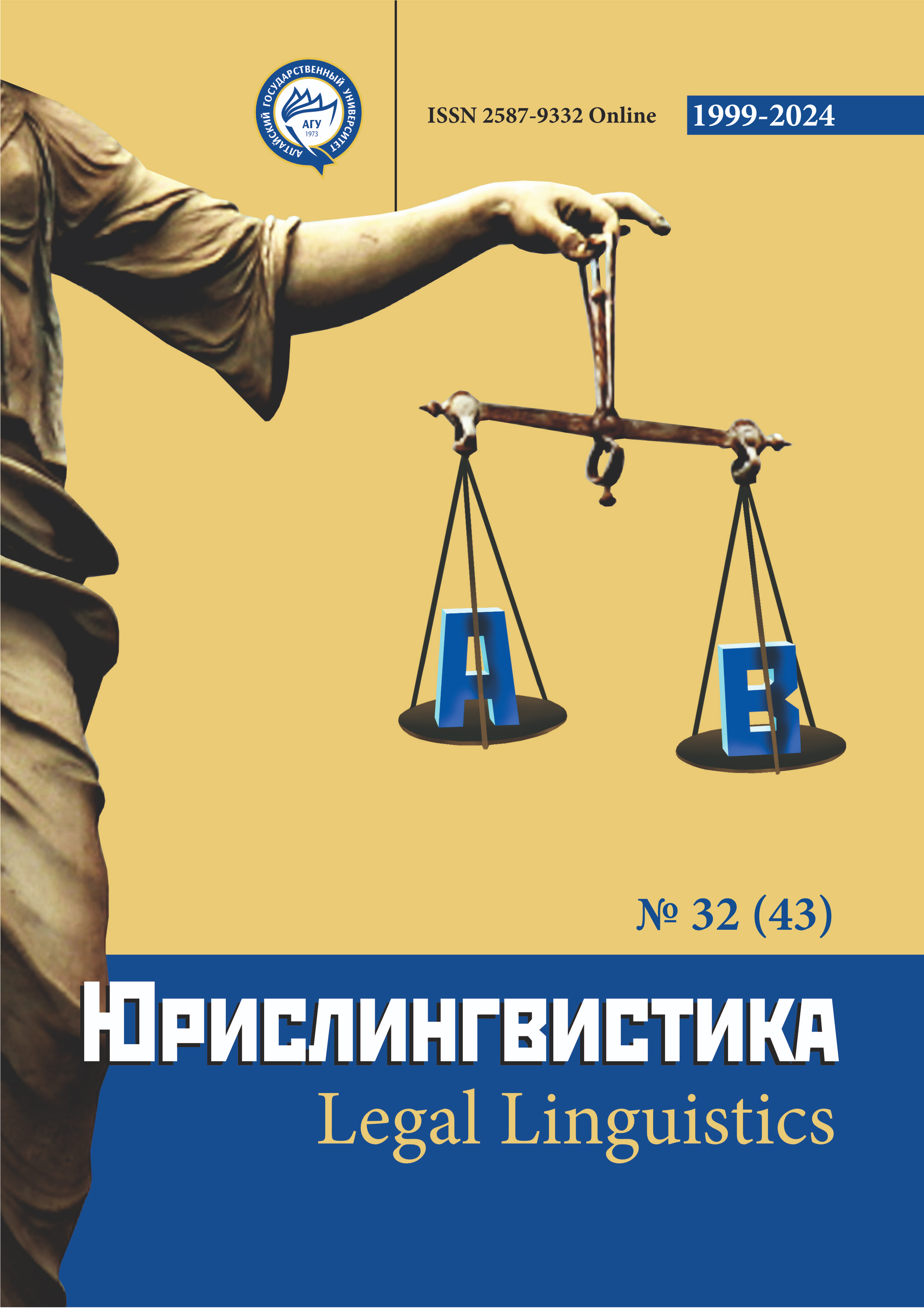Legislative Articles on Juration (Oaths)
УДК 81.42:340.13, ББК 81+67.022.14
Abstract
The purpose of the work is to study the features of legislative articles on juration and oaths. The functional and procedural specificity of taking the oath (juration) is indicated. The structural components, lexical composition, unification, and variability of titles and texts of articles of this type are considered. The introductory, main and additional parts of the articles are distinguished. When characterizing the main part of a legislative article, attention is paid to the combination of texts of different types (expression of will, influence, persuasion). The legislative requirements used in formulating the introductory part (introductory-definitive) and additional parts (explanatory, informative and regulatory) are characterized. It is noted that, despite the existing structural and content-related differences, legislative articles on juration represent specific transformations of the general text type. The more templates are reproduced, the more such articles illustrate the features of legislative style. At the same time the use of clichés and means traditionally used in the construction of non-legislative texts introduces features of other (non-legislative) styles, their functional and pragmatic specificity into the article on juration and into the law where this article belongs. Methods and approaches traditional for legal linguistics are used. The research material is the texts of legislative acts.
Downloads
Metrics
References
Бринев К. И. Лингвистические теории и лингвистические экспертные исследования: проблема взаимосвязи юридической и теоретической лингвистики / Сибирский филологический журнал. 2010. № 1. С. 179-187.
Голев Н. Д. Юрислингвистика. Вводный очерк теории: учебное пособие / Н. Д. Голев. Кемерово: Кемеровский гос. ун-т, 2021. 214 с.
Ефремов В. А. Понятный язык и его параметризация // Актуальные проблемы гуманитарного знания в техническом вузе : Сб. научн. трудов IX Междун. научн.-методич. конф., Санкт-Петербург, 19-20 октября 2023 года. Санкт-Петербург: Санкт-Петербургский горный ун-т, 2023. С. 33-37.
Иванова Е. А. Присяга следователя – правовая и нравственная основа службы в Следственном комитете Российской Федерации / Право и государство: теория и практика. 2020. № 1 (181). С. 144-147.
Кузнецов С. А. Большой толковый словарь русского языка. URL: https://gramota.ru/poisk?query=%D0%BF%D1%80%D0%B8%D1%81%D1%8F%D0%B3%D0%B0&mode=all. Дата обращения: 06.04.2024.
Орлова А. В. Лексико-семантическое поле «клятва» и способы его репрезентации в русском языке XI – XVII вв.: автореф. дис. … канд. филол. наук: 10.02.01 / Орлова Антонина Вячеславовна. Москва, 2022. 22 с.
Почекаев Р. Ю., Тарасов Н. В. Присяга на подданство в отечественной истории и присяга на гражданство в современной России: традиции и новации / Вестник Российского университета дружбы народов. Серия: Юридические науки. 2023. Том 27. № 3. С. 595-608.
Русакова Н. Г. Присяга при приобретении гражданства Российской Федерации иностранцами / Юридическая наука и практика: Вестник Нижегородской академии МВД России. 2017. № 4 (40). С. 205-207.
Санников С. В. Клятва и присяга как перформативные акты «микрофизики» власти / Universum: филология и искусствоведение: электрон. научн. журн. 2017. № 10 (44). URL: http://7universum.com/ru/philology/archive/item/5171. Дата обращения: 06.04.2024.
Словарь русского языка С. И. Ожегова. URL: https://slovarozhegova.ru/word.php?wordid=24101. Дата обращения: 06.04.2024.
Трубникова Ю. В., Доронина С. В. Проблемы формирования навыков владения деловой речью в аспекте развития профессиональной языковой личности / Лингвориторическая парадигма. 2020. № 25-1. С. 110-112.
Хижняк С. П. Пути и алгоритмы упорядочения законодательной терминологии / Юрист-Правовед. 2022. № 3(102). С. 133-137.
Хитарова Е. Г. Присяга как дискурсивная формула в английском и русском языках / Сборники конференций НИЦ «Социосфера». 2017. № 16. С. 22-24.
Чаплинский Ф. Ф. Присяга в конституционно-правовом статусе публичных и непубличных субъектов: автореф. дис. … канд. юрид. наук: 12.00.02 / Чаплинский Федор Федорович. Белгород, 2019. 23 с.
Чернышова Т. В. Прикладные аспекты официально-деловой коммуникации: принципы оценки деловых текстов / Филология и человек. 2016. № 2. С. 177-191.
Щенникова Л. В. Присяга как этический гимн нотариальной деятельности / Нотарiальный вѣстникъ. 2020. № 12. С. 46-55.
Copyright (c) 2024 Марина Батюшкина

This work is licensed under a Creative Commons Attribution 4.0 International License.
The authors, which are published in this journal, agree to the following conditions:
1. Authors retain the copyright to the work and transfer to the journal the right of the first publication along with the work, at the same time licensing it under the terms of the Creative Commons Attribution License, which allows others to distribute this work with the obligatory indication of the authorship of this work and a link to the original publication in this journal .
2. The authors retain the right to enter into separate, additional contractual agreements for the non-exclusive distribution of the version of the work published by this journal (for example, to place it in the university depository or to publish it in a book), with reference to the original publication in this journal.
3. Authors are allowed to post their work on the Internet (for example, in a university repository or on their personal website) before and during the review process of this journal, as this may lead to a productive discussion, as well as more links to this published work (See The Effect of Open Access).











